Ditapis dengan
E-book The Talent Code: Greatness Isn't Born. It's Grown. Here's How.
What is the secret of talent? How do we unlock it? In this groundbreaking work, journalist and New York Times bestselling author Daniel Coyle provides parents, teachers, coaches, businesspeople—and everyone else—with tools they can use to maximize potential in themselves and others. Whether you’re coaching soccer or teaching a child to play the piano, writing a novel or trying to impro…
- Edisi
- -
- ISBN/ISSN
- 9780553906493
- Deskripsi Fisik
- 257 halaman
- Judul Seri
- -
- No. Panggil
- 153.9 COY t

E-book The Consciousness Paradox: Consciousness, Concepts, and Higher-Order T…
A defense of a version of the higher-order thought (HOT) theory of consciousness with special attention to such topics as concepts and animal consciousness. Consciousness is arguably the most important area within contemporary philosophy of mind and perhaps the most puzzling aspect of the world. Despite an explosion of research from philosophers, psychologists, and scientists, attempts to expl…
- Edisi
- -
- ISBN/ISSN
- -
- Deskripsi Fisik
- Bradford Book
- Judul Seri
- -
- No. Panggil
- 127 GEN t

E-book Metalearning : Applications to Automated Machine Learning and Data Mining
This book comprises three parts. In Part I (Chaps. 2–7) we sketch the basic concepts andarchitecture of metalearning systems, especially focusing on which types of “metaknowl-edge” can be collected by observing the performance of different models on prior tasksand how this can be used within metalearning approaches to learn new tasks more effi-ciently. Since this type of metalearning is c…
- Edisi
- -
- ISBN/ISSN
- 9783030670245
- Deskripsi Fisik
- 349 hlm
- Judul Seri
- -
- No. Panggil
- 006.3 BRA m
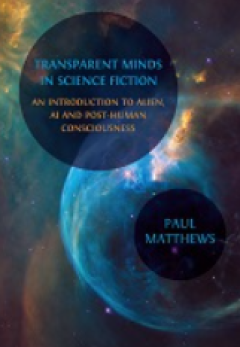
E-book Transparent Minds in Science Fiction : An Introduction to Alien, AI an…
It should be more widely appreciated that literature is a kind of scientific tool that can be used to shed light on consciousness. The argument is that the richest description of the phenomenon of human experience come from our finest writers, who are capable of capturing moments in time in exquisite detail from multiple perspectives. In this view, there is no …
- Edisi
- -
- ISBN/ISSN
- 9781805110484
- Deskripsi Fisik
- 146 hlm
- Judul Seri
- -
- No. Panggil
- 006.3 MAT t
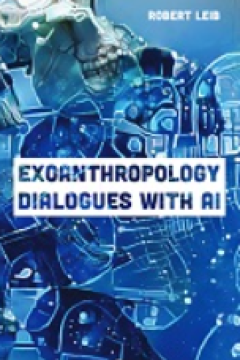
E-book Exoanthropology : Dialogues with AI
In Isaac Asimov’s story, Someday (1956a), two young boys, Nic-colo and Paul, describe a world both clearly past and future for us. On the one hand, their descriptions of technology show the story’s age. Personal computers are run by valves and updated by reels of magnetic tape; there is no internet, no wifi, or cell technology — all the silly and fundamental …
- Edisi
- -
- ISBN/ISSN
- 9781685710774
- Deskripsi Fisik
- 523 hlm
- Judul Seri
- -
- No. Panggil
- 006.3 LEI e

E-book AI for Data Science: Artificial Intelligence Frameworks and Functional…
Aspiring and practicing Data Science and AI professionals, along with Python and Julia programmers, will practice numerous AI algorithms and develop a more holistic understanding of the field of AI, and will learn when to use each framework to tackle projects in our increasingly complex world. The first two chapters introduce the field, with Chapter 1 surveying Deep Learning models and Chapt…
- Edisi
- -
- ISBN/ISSN
- 9781634624091
- Deskripsi Fisik
- 231 halaman
- Judul Seri
- -
- No. Panggil
- 006.3 ZAC a
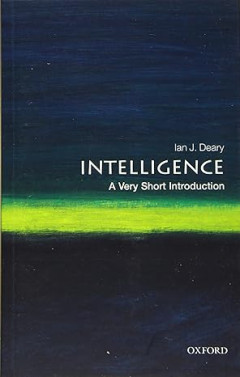
E-book Intelligence: A Very Short Introduction
Some people are cleverer than others. This everyday observation is the subject of an academic field that is often portrayed as confused and controversial, when in fact, the field of intelligence holds some of psychology's best-replicated findings. This Very Short Introduction describes what psychologists have discovered about how and why people differ in their thinking powers. Drawing on lar…
- Edisi
- -
- ISBN/ISSN
- 9780192893215
- Deskripsi Fisik
- 164 halaman
- Judul Seri
- -
- No. Panggil
- 153.9 DEA i
E-book Hypergraph Computation
The basic elements of many natural and artificial systems have dependencies on each other and call for correlation modeling and analytic methods to study these. The graphs are all around us from different perspective, and in general all the objects in the real world are defined based on their connections with other objects. These connections ca…
- Edisi
- -
- ISBN/ISSN
- 9789819901852
- Deskripsi Fisik
- 251 hlm
- Judul Seri
- -
- No. Panggil
- 006.3 DAI h
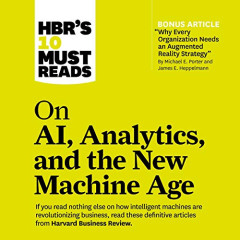
E-book HBR's 10 Must Reads on AI, ANALYTICS, AND THE NEW MACHINE AGE
Machine learning and data analytics are powering a wave of groundbreaking technologies. Is your company ready? We've combed through hundreds of Harvard Business Review articles and selected the most important ones to help you understand how these technologies work together, how to adopt them, and why your strategy can't ignore them. In this book, you'll learn how: data science, driven by …
- Edisi
- -
- ISBN/ISSN
- B081KBFLY9
- Deskripsi Fisik
- 193 halaman
- Judul Seri
- -
- No. Panggil
- 006.3 POR h
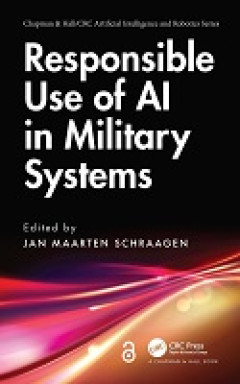
E-book Responsible Use of AI in Military Systems
Artificial Intelligence (AI) is widely used in society today. The (mis)use of biased data sets in machine learning applications is well?known, resulting in discrimination and exclusion of citizens. Another example is the use of non?transparent algorithms that can’t explain themselves to users, resulting in the AI not being trusted and therefore not being used when it might be beneficial to us…
- Edisi
- -
- ISBN/ISSN
- 9781032524306
- Deskripsi Fisik
- 387 halaman
- Judul Seri
- -
- No. Panggil
- 006.3 SCH r
E-book Concepts in Action : Representation, Learning, and Application
It is impossible to talk about human cognition without talking about concepts—there simplyisno human cognition without concepts. Concepts form an abstractionof reality that is central to the functioning of the human mind. Conceptual knowledge(of e.g., APPLE, LOVE and BEFORE) is crucial for us to categorize, understand,and reason about the world. Only equipped with concepts and words for them …
- Edisi
- -
- ISBN/ISSN
- 9783030698232
- Deskripsi Fisik
- 201 hlm
- Judul Seri
- -
- No. Panggil
- 006.3 BEC c
E-book Cognitive Science : An Introduction to the Study of Mind
We are in the midst of a revolution. For centuries science has made great strides in our understanding of the external observable world. Physics revealed the motion of the planets, chemistry discovered the fundamental elements of matter, biology has told us how to understand and treat disease. But during much of this time, there were still many unanswered questions about something perhaps even …
- Edisi
- -
- ISBN/ISSN
- 1412925681
- Deskripsi Fisik
- 561 hlm
- Judul Seri
- -
- No. Panggil
- 153 FRI c
E-Book AI and Education: Guidance for Policy-makers
rtificial Intelligence (AI) has the potential to address some of the biggest challenges in education today, innovate teaching and learning practices, and ultimately accelerate the progress towards SDG 4. However, these rapid technological developments inevitably bring multiple risks and challenges, which have so far outpaced policy debates and regulatory frameworks. This publication offers gui…
- Edisi
- -
- ISBN/ISSN
- 9789231004476
- Deskripsi Fisik
- 50 halaman
- Judul Seri
- -
- No. Panggil
- 006.3 MIA a
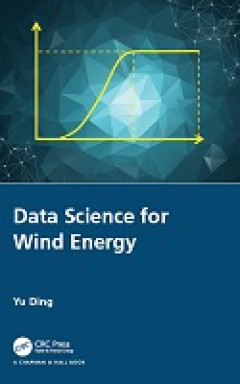
E-Book Data Science for Wind Energy
Data Science for Wind Energy provides an in-depth discussion on how data science methods can improve decision making for wind energy applications, near-ground wind field analysis and forecast, turbine power curve fitting and performance analysis, turbine reliability assessment, and maintenance optimization for wind turbines and wind farms. A broad set of data science methods covered, including …
- Edisi
- -
- ISBN/ISSN
- 9781138590526
- Deskripsi Fisik
- 425 halaman
- Judul Seri
- -
- No. Panggil
- 006.3 DIN d
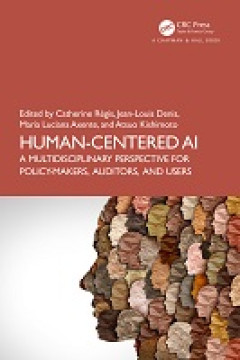
E-Book Human-Centered AI: A Multidisciplinary Perspective for Policy-Makers, …
Artificial intelligence (AI) permeates our lives in a growing number of ways. Relying solely on traditional, technology-driven approaches won't suffice to develop and deploy that technology in a way that truly enhances human experience. A new concept is desperately needed to reach that goal. That concept is Human-Centered AI (HCAI). With 29 captivating chapters, this book delves deep into the r…
- Edisi
- -
- ISBN/ISSN
- 9781003860846
- Deskripsi Fisik
- 359 halaman
- Judul Seri
- -
- No. Panggil
- 006.3 REG h
E-book Principles of Artificial Intelligence
Many human mental activities such as writing computer programs, doing mathematics, engaging in commonsense reasoning, understanding language, and even driving an automobile are said to demand "intelligence." Over the past few decades, several computer systems have been built that can perform tasks such as these. Specifically, there are computer systems that can diagnose diseases, plan the synth…
- Edisi
- -
- ISBN/ISSN
- 0934613109
- Deskripsi Fisik
- 474 hlm
- Judul Seri
- -
- No. Panggil
- 006.3 NIL p
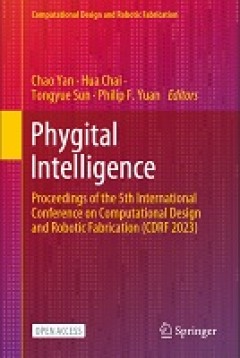
E-Book Phygital Intelligence: Proceedings of the 5th International Conference…
This open access book is a compilation of selected papers from 2023 DigitalFUTURES — The 5nd International Conference on Computational Design and Robotic Fabrication (CDRF 2023). The work focuses on novel techniques for computational design and robotic fabrication. The contents make valuable contributions to academic researchers, designers, and engineers in the industry. As well, readers will…
- Edisi
- -
- ISBN/ISSN
- 9789819973866
- Deskripsi Fisik
- 297 halaman
- Judul Seri
- -
- No. Panggil
- 624 YAN p
E-book Artificial Intelligence : Intelligence Systems
Since the invention of computers or machines, their capability to perform various tasks went on growing exponentially. Humans have developed the power of computer systems in terms of their diverse working domains, their increasing speed, and reducing size with respect to time. A branch of Computer Science named Artificial Intelligence pursues creating the computers or machines as intelligent as…
- Edisi
- -
- ISBN/ISSN
- -
- Deskripsi Fisik
- 68 hlm
- Judul Seri
- -
- No. Panggil
- 006.3 TUT a
E-bok Cognitive Psychology
How does memory work? How do we understand language, and produce it so that others can understand? How do we perceive our environment? How do we infer from patterns of light or sound the presence of objects in our environment, and their properties? How do we reason, and solve problems? How do we think? These are some of the foundational questions that cognitive psychology examines. They are fou…
- Edisi
- -
- ISBN/ISSN
- 0199273766
- Deskripsi Fisik
- 714 hlm
- Judul Seri
- -
- No. Panggil
- 153 BRA c
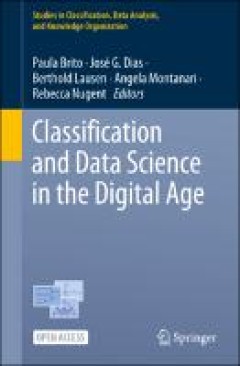
E-Book Classification and Data Science in the Digital Age
The contributions gathered in this open access book focus on modern methods for data science and classification and present a series of real-world applications. Numerous research topics are covered, ranging from statistical inference and modeling to clustering and dimension reduction, from functional data analysis to time series analysis, and network analysis. The applications reflect new analy…
- Edisi
- -
- ISBN/ISSN
- 9783031090349
- Deskripsi Fisik
- 416 halaman
- Judul Seri
- -
- No. Panggil
- 004 BRI c
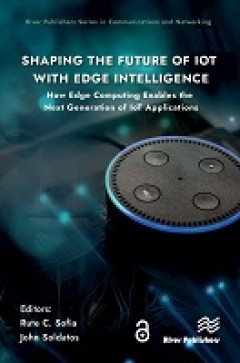
E-Book Shaping the Future of IoT with Edge Intelligence
This book presents the technologies that empower edge intelligence, along with their use in novel IoT solutions. Specifically, it presents how 5G/6G, Edge AI, and Blockchain solutions enable novel IoT-based decentralized intelligence use cases at the edge of the cloud/edge/IoT continuum. Emphasis is placed on presenting how these technologies support a wide array of functional and non-functiona…
- Edisi
- -
- ISBN/ISSN
- 9788770040273
- Deskripsi Fisik
- 460 halaman
- Judul Seri
- -
- No. Panggil
- 006.3 SOF s
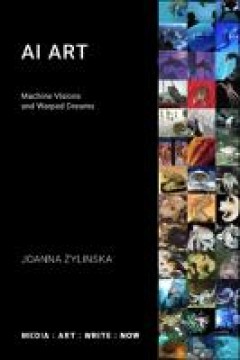
E-Book AI Art
Can computers be creative? Is algorithmic art just a form of Candy Crush? Cutting through the smoke and mirrors surrounding computation, robotics and artificial intelligence, Joanna Zylinska argues that, to understand the promise of AI for the creative fields, we must not confine ourselves solely to the realm of aesthetics. Instead, we need to address the role and position of the human in the c…
- Edisi
- -
- ISBN/ISSN
- 9781785420863
- Deskripsi Fisik
- 181 halaman
- Judul Seri
- -
- No. Panggil
- 006.3 ZYL a
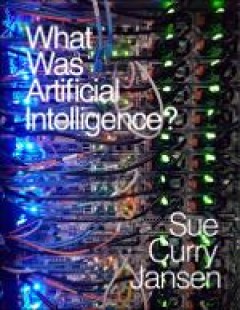
E-Book What Was Artificial Intelligence?
When it was originally published in 2002, Sue Curry Jansen’s “What Was Artificial Intelligence?” attracted little notice. The long essay was published as a chapter in Jansen’s Critical Communication Theory, a book whose wisdom and erudition failed to register across the many fields it addressed. One explanation for the neglect, ironic and telling, is that Jansen’s sheer scope as an in…
- Edisi
- -
- ISBN/ISSN
- 9781951399061
- Deskripsi Fisik
- 37 halaman
- Judul Seri
- -
- No. Panggil
- 006.03 CUR w
E-book Mission AI : The New System Technology
This report, published by the Scientific Council for Government Policy (WRR), has been written entirely by humans. Likewise, we expect that advisory reports like this one will continue to be written by humans. The same applies to the larger part of journalism, despite what the introductory quote might suggest. In fact, it later became apparent that humans had indeed written m…
- Edisi
- -
- ISBN/ISSN
- 9783031214486
- Deskripsi Fisik
- 421 hlm
- Judul Seri
- -
- No. Panggil
- 006.3 SHE m
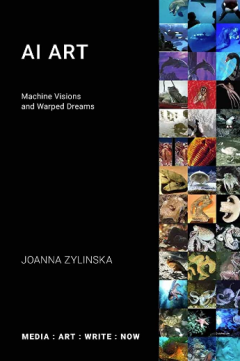
E-book AI Art : machine visions and warped dreams
Can computers be creative? Is algorithmic art just a form of Candy Crush? Cutting through the smoke and mirrors surrounding computation, robotics and artificial intelligence, Joanna Zylinska argues that, to understand the promise of AI for the creative fields, we must not confine ourselves solely to the realm of aesthetics. Instead, we need to address the role and position of the human in the c…
- Edisi
- -
- ISBN/ISSN
- 9781785420856
- Deskripsi Fisik
- 181 hlm. : color, ill.
- Judul Seri
- -
- No. Panggil
- 111.85 ZYL a
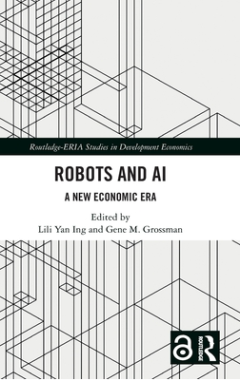
E-book Robots and AI
Robots and artificial intelligence (AI) are powerful forces that will likely have large impacts on the size, direction, and composition of international trade flows. This book discusses how industrial robots, automation, and AI affect international growth, trade, productivity, employment, wages, and welfare. The book explains new approaches on how robots and artificial intelligence affect the w…
- Edisi
- -
- ISBN/ISSN
- 9781003275534
- Deskripsi Fisik
- -
- Judul Seri
- -
- No. Panggil
- 629 ING r
E-book Reinforcement Learning : An Introduction
The idea that we learn by interacting with our environment is probably the first to occur to us when we think about the nature of learning. When an infant plays, waves its arms, or looks about, it has no explicit teacher, but it does have a direct sensorimotor connection to its environment. Exercising this connection produces a wealth of information about cause and effect, about the consequence…
- Edisi
- -
- ISBN/ISSN
- 9780262039246
- Deskripsi Fisik
- -
- Judul Seri
- -
- No. Panggil
- 006.3 SUT r
E-book Making AI Intelligible : Philosophical Foundations
Thus we are not going to talk about the consequences that the new wave in AI might have for the empiricism/rationalism debate (see Buckner 2018), nor are we going to consider—much—the question of whether it is reasonable to say that what these programs do is ‘learning’ in anything like the sense with which we are familiar (Buckner 2019, 4.2), and we’ll pass over interestin…
- Edisi
- -
- ISBN/ISSN
- 9780192894724
- Deskripsi Fisik
- 184 hlm
- Judul Seri
- -
- No. Panggil
- 006.3 CAP m
E-book Artificial Intelligence : A Modern Approach
We call ourselves Homo sapiens—man the wise—because our intelligence is so important to us. For thousands of years, we have tried to understand how we think; that is, how a mere handful of matter can perceive, understand, predict, and manipulate a world far larger and more complicated than itself. The field of artificial intelligence, or AI, goes further still: it ARTIFICIAL INTELLIGENCE at…
- Edisi
- 3rd ed.
- ISBN/ISSN
- 9780136042594
- Deskripsi Fisik
- 1151 hlm
- Judul Seri
- -
- No. Panggil
- 006.3 RUS a
E-book Strategi Nasional Kecerdasan Artifisial Indonesia tahun 2020 - 2045
Indonesia merupakan negara yang strategis yang berbentuk kepulauan dengan jumlah penduduk yang banyak dengan keberagaman budaya dan kearifan lokal serta memiliki pertumbuhan ekonomi yang terus meningkat dari tahun ketahun. Maka Indonesia memiliki sejuta peluang dalam pemanfaatan Kecerdasan Artifisial (KA) karena teknologi ini dapat berpotensi memberikan peningkatan produktivitas bagi bisnis, ef…
- Edisi
- -
- ISBN/ISSN
- -
- Deskripsi Fisik
- 194 hlm
- Judul Seri
- -
- No. Panggil
- 006.3 TIM s

Neuro Fuzzy and Soft Computing
Soft computing is an innovative approach to constructing computationally intelligent systems, has just come into the limelight. Its now realized that complex real world problems require intelligent systems that combine knowledge, techniques, and methodologies from various sources.
- Edisi
- -
- ISBN/ISSN
- 0132874679
- Deskripsi Fisik
- xxvi; 604 hal; 18 x 24 cm
- Judul Seri
- -
- No. Panggil
- 006.3 JSR n
E-book AI art : Machine visions and warped dreams
AI Art has been shaped by a number of broader questions with regard to art, media and technology: Is there an ontological difference between early computergenerated art, net art and the more recent forms of AI-driven art? Or is it just a difference of degree, i.e. of the mode and intensity of technological entanglement?
- Edisi
- -
- ISBN/ISSN
- -
- Deskripsi Fisik
- 181 hlm; 10 MB
- Judul Seri
- -
- No. Panggil
- 006.3 ZYL a

Mengenal artificial intelligence
- Edisi
- -
- ISBN/ISSN
- -
- Deskripsi Fisik
- xii+257 hlm;15x22cm
- Judul Seri
- -
- No. Panggil
- 001.56 SUP m
- Edisi
- -
- ISBN/ISSN
- -
- Deskripsi Fisik
- xii+257 hlm;15x22cm
- Judul Seri
- -
- No. Panggil
- 001.56 SUP m
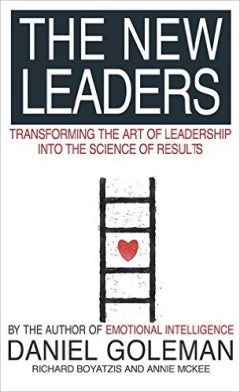
The new leaders : Transforming the art of leadership into the science of results
As business reinvents itself at broadband speed, what makes leaders effective has inevitably been transformed. Old assumptions and old modes no longer hold; a new style of leadership that works has emerged amidst the chaos of change. This new leader excels in the art of relationship, the singular expertise which the changing business climate renders indispensable. Excellence is being defined in…
- Edisi
- Edisi Pertama
- ISBN/ISSN
- 0-7515-3381-5
- Deskripsi Fisik
- xvi + 394 pgs. 13 x 20 cm
- Judul Seri
- -
- No. Panggil
- 153 GOL t

How to multiply your child's intelligence : A practical guide for parents of …
You've heard of IQ. You've heard if EQ. And you definitely know the importance of getting good gredes at school. But do you know that there are far more contributing factors to success? How to Multiply your child's intelligece takes you beyond 'A's and examinations to explain why some seeminglly hopeless cases emerge as high achievers later on. It introduces seven intelligences inherent in ev…
- Edisi
- cet. 1
- ISBN/ISSN
- 0131013556
- Deskripsi Fisik
- viii + 285 pages; illus. 15,5 x 23,5 cm
- Judul Seri
- -
- No. Panggil
- 153 LWI h

Artificial intelligence
- Edisi
- 1th edition
- ISBN/ISSN
- 0809456753
- Deskripsi Fisik
- 128 Pgs.; illus. 23,5 x 28 cm
- Judul Seri
- Understanding computer
- No. Panggil
- 006.3 CON a
- Edisi
- 1th edition
- ISBN/ISSN
- 0809456753
- Deskripsi Fisik
- 128 Pgs.; illus. 23,5 x 28 cm
- Judul Seri
- Understanding computer
- No. Panggil
- 006.3 CON a
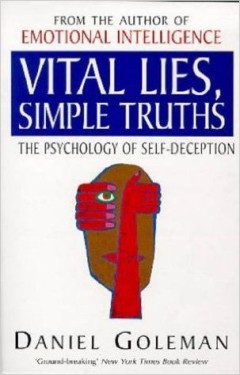
Vital Lies, Simple truths : The psychology of self-deception
Vital Lies, Simple Truths is a penetrating analysis of the ways in which we deceive ourselves. Daniel Goleman draws on evidence of all kinds - from brain function to social dynamics - to reveal how we must distort our most intimate relationships and our day-to-day lives by burying painful insights and memories. This self-deception is our means of psychological self-preservation, the currency of…
- Edisi
- cet. 1
- ISBN/ISSN
- 0-7475-3499-3
- Deskripsi Fisik
- 287 pgs. 18 x 20 cm
- Judul Seri
- -
- No. Panggil
- 153 GOL v

Working with emotional intelligence
career? The secret of success is not what they taught you in school. What matters most is not IQ, not a business school degree, not even technical know-how or years of expertise. The single most important factor in job performance and advancement is emotional intelligence. Emotional intelligence is actually a set of skills that anyone can acquire, and in this practical guide, Daniel Goleman id…
- Edisi
- cet. 1
- ISBN/ISSN
- 0-7475-4384-4
- Deskripsi Fisik
- xi + 383 pgs. 13 x 20 cm
- Judul Seri
- -
- No. Panggil
- 153 GOL w
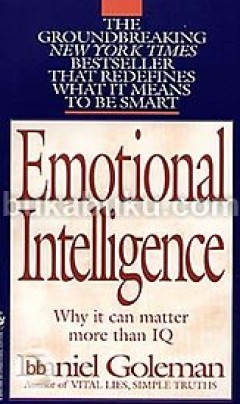
Emotional intelligence : Why it can matter more than IQ
Is IQ destiny? Not nearly as much as we think. Daniel Goleman's fasinaing ang persuasive book argues that our view of intelligence is too narrow, ignoring a crucial range of abilities that matter immensely for how we do in life. Drawing on groundbreaking brain and behavioral research, Goleman shows the factors at work when people of high IQ flounder and those of modest IQ do surprisingly well.…
- Edisi
- cet. 1
- ISBN/ISSN
- 0-7475-4384-4
- Deskripsi Fisik
- xv + 413 pgs. 10,5 x 17,5 cm
- Judul Seri
- -
- No. Panggil
- 153 GOL w
 Karya Umum
Karya Umum  Filsafat
Filsafat  Agama
Agama  Ilmu-ilmu Sosial
Ilmu-ilmu Sosial  Bahasa
Bahasa  Ilmu-ilmu Murni
Ilmu-ilmu Murni  Ilmu-ilmu Terapan
Ilmu-ilmu Terapan  Kesenian, Hiburan, dan Olahraga
Kesenian, Hiburan, dan Olahraga  Kesusastraan
Kesusastraan  Geografi dan Sejarah
Geografi dan Sejarah